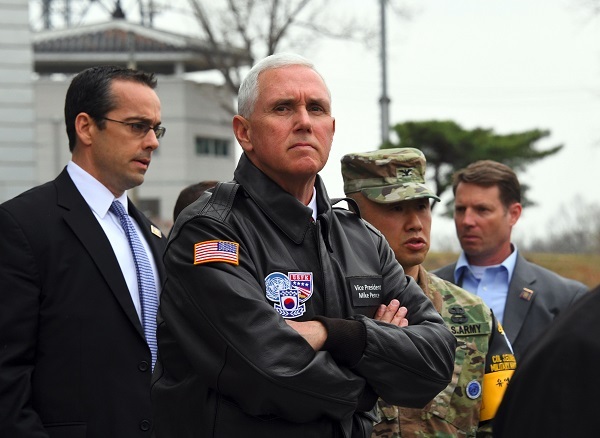US Vice President Mike Pence on Monday warned North Korea against “testing” the US’ military power and resolve to denuclearize the peninsula, saying “all options are on the table.”
At a joint news conference with acting President Hwang Kyo-ahn, Pence declared the end of the “strategic patience” policy, under which Washington has for more than 20 years been making overtures, only to be met with Pyongyang’s “willful deceptions, broken promises and nuclear and missile tests.”
At a joint news conference with acting President Hwang Kyo-ahn, Pence declared the end of the “strategic patience” policy, under which Washington has for more than 20 years been making overtures, only to be met with Pyongyang’s “willful deceptions, broken promises and nuclear and missile tests.”

“The era of strategic patience is over,” Pence said, noting the US pursues peaceful means to tackle the longstanding standoff but “all options are on the table.”
The vice president’s three-day stay came amid spiraling tension on the peninsula. North Korea test-fired a ballistic missile Sunday in celebration of the 105th birthday of late national founder Kim Il-sung, though the launch failed. A US aircraft carrier strike group is en route to South Korea, with President Donald Trump calling on a near daily basis for Beijing to more squeeze Pyongyang to change course.
The recent strike in Syria and bombing on Afghanistan showed the “strength and resolve” of the Trump leadership, Pence said, stressing it will continue to “evolve a comprehensive set of capabilities” to defend South Korea including the deployment of the Terminal High Altitude Area Defense missile shield here.
“North Korea would do well not to test his (Trump’s) resolve or the strength of armed forces of the US in this region,” he said.
“We will defeat any attack and we will meet any use of conventional and nuclear weapons with an overwhelming and effective response.”
With South Korea gearing up for a May 9 presidential election, Pence displayed confidence in sustained cooperation with the next leadership here, to which he said he is “looking forward with great expectations.”
As the Trump administration hardens its line against Pyongyang, concerns have risen that Seoul and Washington may face a discord in coordinating North Korea policy. Some of leading presidential candidates such as frontrunner Moon Jae-in previously served in progressive governments that traditionally favor engagement with the communist state rather than sanctions and pressure.
“Whatever changes happen in your election, the commitment of the US to South Korea‘s safety and security will remain unchanged,” Pence said.
“On behalf of the president of the US, my message to the people of South Korea is this: We are with you 100 percent. Even in this troubled times, we stand with you for a free and secure future.”
During their talks, Hwang and Pence agreed to take “strong punitive steps” if the Kim Jong-un regime conducts another provocation, Hwang said, calling for China’s “constructive” role in reining in the erratic leader.
The prime minister also upheld the THAAD stationing plan, saying it would be finished “at an early date” as planned.

Hwang’s remarks were apparently intended to calm speculation erupted after a White House foreign policy adviser accompanying Pence on the tour told reporters Sunday that the completion of the ongoing installment is up to the next South Korean president.
The vice president’s spokesperson and Seoul’s Foreign Ministry denied any change in the plan following the reports. But Defense Ministry spokesperson Moon Sang-gyun said Monday the deployment will be unlikely to end “in a short period of time given the current progress.”
While lauding Beijing’s efforts to step up its enforcement of sanctions, Pence criticized China for its escalating economic retaliation against South Korea over the THAAD program, calling it “troubling.”
“The better path would be for China to address North Korean threat that is actually making such defensive measures necessary,” he said.
“While issues like that remain, the president and I have great confidence that China will properly deal with North Korea but as President Trump made clear just a few short days ago, if China is unable to deal with North Korea, the US and our allies will.”
Visiting the Demilitarized Zone separating the two Koreas earlier in the day, the vice president relayed Trump’s message that Beijing should use its “extraordinary levers” to shift the Kim regime’s calculations, saying “we look for them to do more.”
For Pence, whose late father fought in the Korean War in 1952-53 as a second Army lieutenant, the border tour was “humbling” and expressed an “unbreakable bond” between the two countries’ peoples.
“We are bound together by our shared values but also by our shared sacrifices. A free and democratic South Korea was forged in the fire of sacrifice by soldiers from both lands, and my father was one of them,” he said.
Pence is the latest high-profile Trump administration official to visit Seoul, following Secretary of Defense James Mattis and Secretary of State Rex Tillerson.
Ahead of a joint news conference, Hwang and Pence also had a lunch meeting at his residence. Earlier the vice president met with US Forces Korea commander Gen. Vincent Brooks at its headquarters in Seoul.
Pence kicked off his Asia tour late Sunday by laying a wreath at the National Cemetery in Seoul, followed by an Easter service and dinner gathering with South Korean and US soldiers.
He is scheduled to meet with business leaders Tuesday, before continuing to travel to Japan. He will also visit Indonesia and Australia later in the week and then Hawaii, home to the US Pacific Command.
By Shin Hyon-hee (heeshin@heraldcorp.com)










![[Hello India] Hyundai Motor vows to boost 'clean mobility' in India](http://res.heraldm.com/phpwas/restmb_idxmake.php?idx=644&simg=/content/image/2024/04/25/20240425050672_0.jpg&u=)








